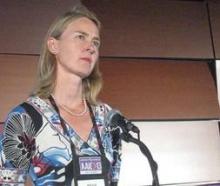BOSTON – Like a belt and suspenders, the presence of measurable biomarkers in cerebrospinal fluid gives clinicians added confidence, even when they are already comfortable with a diagnosis of dementia, reported investigators at the Alzheimer’s Association International Conference 2013.
A study of how neurologists incorporate biomarkers such as amyloid-beta 42, tau, and phosphorylated tau into their diagnostic practice found that in a substantial proportion of patients, cerebrospinal fluid (CSF) results prompted some type of change in patient management, such as a different diagnosis or additional studies, reported Wiesje van der Flier, Ph.D., senior researcher in neurology at the VU University Medical Center in Amsterdam.
"Countless studies have shown that these biomarkers have good discriminatory value for identifying Alzheimer’s disease [AD], but almost all of these studies have been performed in selected research populations. Nevertheless, these biomarkers are increasingly being used in regular clinical practice," Dr. van der Flier said.
She noted that the 2011 recommendations from the National Institute on Aging-Alzheimer’s Association workgroups on diagnostic guidelines for AD state that "the use of biomarkers to enhance certainty of AD pathophysiological process may be useful in three circumstances: investigational studies, clinical trials, and as optional clinical tools for use where available and when deemed appropriate by the clinician."
Despite these recommendations, there are still no clear guidelines for clinicians and considerable variability in interpretation of results, she said.
To see how clinicians were using biomarkers in their center, they conducted a prospective study during June 2011-May 2012.
A total of 438 patients, 351 of whom underwent lumbar puncture for CSF screening, were included. The patients were diagnosed by a multidisciplinary team blinded to each patient’s biomarker status, and neurologists were asked to fill out questionnaires both before and after disclosure of CSF status. The primary outcome measure was change in diagnosis, and the neurologist’s confidence in that diagnosis.
The majority of neurologists (74%) said that they wanted to know the results of the lumbar puncture before they were disclosed, with 46% saying they hoped it would confirm the diagnosis, 36% saying they wished to exclude a diagnosis of AD, 11% hoping to reassure the patient, 24% saying they wanted to assess prognosis, and 11% saying they wanted to select patients for possible clinical trials.
Neurologists tended to be more confident with their diagnoses when they felt it wasn’t necessary to have CSF findings first (90% vs. 82%; P less than .001).
CSF results caused a change of diagnosis in 7% of all patients with CSF tests (23 cases).
The findings bolstered clinician confidence in the diagnosis in the majority of cases where the results did not change diagnosis, from 84% before disclosure, to 89% after (P = .001). The increase was significant for individual diagnoses of AD (P less than .001), other dementia (P less than .01) and mild cognitive impairment (P less than .001).
In 13% of patients with CSF findings and unchanged diagnosis (40 patients), the physicians reported losing confidence in the diagnosis because the CSF findings were discordant with the clinical diagnosis. Many of these had more intensive clinical follow-up or additional studies, Dr. van der Flier said.
The study was funded by Dutch public agencies, and the VU Medical Center has received support for imaging studies and clinical trials from Nutricia, Lilly, Merck, Novartis, Roche, and Janssen-Pfizer. Dr. van der Flier reported having no personal conflicts of interest.


